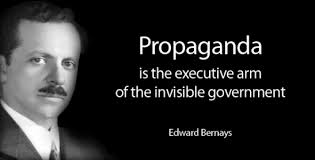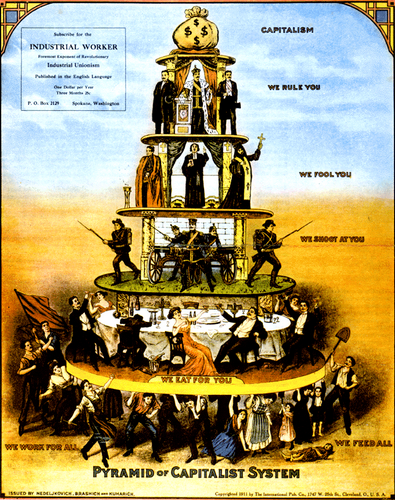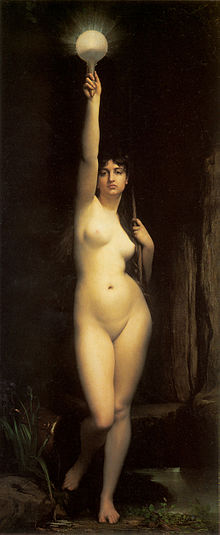
Propaganda: by Henry K van Eyken Here are some paragraphs written in 1928 with, essentially, an American readership in mind: 3 "The conscious and intelligent manipulation of the organized habits and opinions of the masses is an important element in democratic society. Those who manipulate this unseen mechanism of society constitute an invisible government which is the true ruling power of our country. 4 "We are governed, our minds molded, our tastes formed, our ideas suggested, largely by men we have never heard of. The is a logical result of the way in which our democratic society is organized. Vast numbers of human beings must cooperate in this manner if they are to live together as a smoothly functioning society. 5 "Our invisible governors are, in many cases, unaware of the identity of their fellow members in the inner cabinet. 6 "They govern us by their qualities of natural leadership, their ability to supply needed ideas and by their key position in the social structure. Whatever attitude one choose toward this condition, it remains a fact that in almost every act of our daily lives, whether in the sphere of politics or business, in our social conduct or our ethical thinking, we are dominated by the relatively small number of persons—a trifling fraction of our hundred and twenty million—who understand the mental processes and social patterns of the masses. It is they who pull the wires which control the public mind, who harness old social forces and contrive new ways to bind and guide the world. 7 "It is not usually realized how necessary these invisible forces are to the orderly functioning of our group life. In theory, every citizen may vote for whom he please ...." 8 "In theory, every citizen makes up his mind on public questions and matters of private conduct. In practice, if all men had to study for themselves the abstruse economic, political, and ethical data involved in every question, they would find it impossible to come to a conclusion without anything. We have voluntarily agreed to let an invisible government to sift the data and high-spot the outstanding issue so that our field of choice shall be narrowed to practical proportions. From our leaders and the media they use to reach the public, we accept the evidence and demarcation issues bearing upon public question; from some ethical teacher, being a minister, a favorite essayist, or merely prevailing opinion, we accept a standardized code of social conduct to which we conform most of the time. 10 "In theory, everybody buys the best and cheapest commodities offered him on the market. In practice, if everyone went around pricing, and chemically tasting before purchasing the dozen of soaps or fabrics or brands of bread which are for sale, economic life would be hopelessly jammed. To avoid such confusion, society consents to have its choice narrowed to ideas and objects brought to its attention through propaganda of all kinds. There is consequently a vast and continuous effort going on to capture our minds in the interest of some policy or commodity or idea." 11  Edward Bernays used what he learned from his uncle Sigmund Freud to create techniques for influencing the public mind. Clicking on this image's source will take you to a 14-min. podcast about this very subject. It is shocking. 9 These quotes have been taken from the book "Propaganda" by Edward Bernays. Careful reading shows us truth, but truth with a personal bias. The bias is easily discerned once the reader knows that Bernays was a propagandist par excellence who made his skills available to the highest bidder. He advertised propaganda by down-pedalling the negative connotation of propaganda by putting it in a positive light, thereby salving inhibiting consciousnesses from availing themselves from his services. True, Bernays does make some mention of the negative aspect of propaganda as well, but by and large he presents it as essential for society to function, and (or "but") one for people with deep pockets to buy into! 12 The book was reprinted in 2005 together with an introduction by Mark Crispin Miller that is, interestingly, highly critical of the work and its author. An education in itself. 13 We recognize "our invisible governors" as the people working in advertising and public relations. In fact, those epithets, "advertising" and "public relations" are merely euphemisms for commercial propaganda so as to avoid that dirty word "propaganda." Also among "our invisible governors" are our governments at the federal, provincial and municipal level. Here is but a small example of governmental propaganda used in support to the government's stance on the involvement in the conflict between Ukraine and Russia as found in The [Montreal] Gazette of March 14, 2015, p. A22. Quoting from the article "NATO disputes claim of Russian hostility" by David Puliese: 14 "James Beam, parliamentary secretary to Minister of National Defence Jason Kenney, told the House of Commons this week: 16 "'Since arriving in the Black Sea, Royal Canadian Navy sailors have been confronted by Russian warships and buzzed by Russian fighter jets.' 17 "Kenney also repeated the claim the next day, stating that a Russian jet buzzed the Canadian frigate HMCS Fredericton at low altitude." 17B But, according to the article, NATO officials say no such thing happened. Russian vessels could be seen far off on the horizon, kilometres away and Russian aircraft had flown over the task force at high altitudes, at one point getting as close as 128 km. The Russians abided by all regulations required by vessels in international waters. Their behaviour was no different than that of Canada's Royal Navy when Russian ships showed up on Canada's coast. 17C "Some former Canadian diplomats have suggested the the government's position on Ukraine is aimed at winning votes from Ukrainian-Canadians in the federal election this year," the article says. 17D To be sure, I am not disputing the stance our country is taking with respect to the Canadian conflict, but to use our military involvement in serious international conflicts for partisan politics within Canada, well, that is something to be very concerned about. Another example of how politicians abuse our democracy to such purpose is found in the essay about improving the usefulness of our Senate, see here. 18 The molding of our minds begins at age 0, purposefully so by parents and professional educators. In part, we uncritically learn to adapt ourselves to prevailing norms of behavior, in part we begin to acquire the basic tools for functioning in our society: 20 School days, school days, We adopt the behavior of our roll models, unfortunately not always the best kind our society has to offer. And gradually we learn to think critically, in various directions and at a varying pace, all depending on what we already "know" and the environment we live in as well as contacts with persons with different such backgrounds. Further differentiation occurs depending, among other things, the physical and mental skills we accidentally and deliberately acquire—such as trades, professions, etc.—the clubs and associations we belong to, the spouses we married, the friends we seek, the books we read, the news we are exposed to. The list seems to have no end. 22 The notion that a society of widely varying mindsets needs a glue to bind them together, a glue in the forms of a strong, overriding characteristics. Else there would be no such thing as a society Traditionally, those characteristics include shared religion and a hierarchy of rulers. In Western societies, medieval times were characterized by the Roman Catholic Church and a king or emperor at the top of a feudal system of distributed responsibilities, in simplistic terms: "The cleric prayed for all, the knight fought for all, the serf worked for all." But over time, feudalism made way for democracy, which would be a rule by all. Democracy has become workable by delegating certain responsibilities by electing representatives, MPs categorized by political parties and the party winning the majority of votes cast assigning various responsibilities to ministers, etc., etc.* 23 It is in the narrowing down of the options for the electorate to one of a few candidates with the dual role to look after the interests of those in his electoral district and membership in some party that "our invisible governors" (party strategists, editorialists) perform their roles, and not always adhering to reasonable ethical standards (think of "attack ads" and "smear campaigns"). Could we dispense with those invisible governors? The answer is not hard to find if one considers the huge amounr of information individuals need to acquire and sort through! Improvement cannot be found by dispensing with those governors, only by holding them to high ethical standards. 24 The control over the public mind by "our invisible governors" can be significantly ameliorated by our Canadian Senate learning to function as a think tank along the lines advocated in the senate essay published on this website. 24A Standards, yes, well .... The field of propaganda has its bevy of theorists. Among the notions Zbynek Zeman came up with is a distinction between white, grey, and black propaganda: 25 White: discloses its sources. Going back to the origin of the word "propaganda," in 1822 the Roman Catholic Church created an administrative body known as the "Congregatio de Propaganda Fide" (Congregation for Propagating the Faith) in an effort to staunch the inroads of Protestantism. "Propaganda" means "that which is to be propagated." The word gained use in the secular sphere of life and eventually acquired a perjorative connotation, notably in politics. 27 Defining propaganda as distinct from simply providing information is hard. Here is one definition (by Richard Alan Nelson): 29 "Propaganda is the deliberate, systematic attempt to shape perceptions, manipulate cognitions, and direct behavior to achieve a response that furthers the desired intent of the propagandist." More comprehensive is the description by Richard Alan Nelson: "Propaganda is neutrally defined as a systematic form of purposeful persuasion that attempts to influence the emotions, attitudes, opinions, and actions of specified target audiences for ideological, political or commercial purposes through the controlled transmission of one-sided messages (which may or may not be factual) via mass and direct media channels. A propaganda organization employs propagandists who engage in propagandism—the applied creation and distribution of such forms of persuasion." 30 Somewhat different, but more workable (by Garth Jowett and Victoria O'Donnell) goes: 31 "Propaganda is the deliberate, systematic attempt to shape perceptions, manipulate cognitions, and direct behavior to achieve a response that furthers the desired intent of the propagandist." 32 You get the picture. We might thus distinguish between formal education and more general information from propaganda. 33  "Pyramid of capitalist system": Famous cartoon published by "The Industrial Worker (the voice of revolutionary industrial unionism)" in 1911. The newspaper is published by the Industrial Workers of the World (IWW) and is frequently distributed at radical bookstores, demonstrations, strikes and labor rallies. (Source). 34 Propaganda has become more common in political contexts, in particular to refer to certain efforts sponsored by governments, political groups, but also often covert interests—for some examples refer back to the above and following paragraphs about Russians encroaching on a Canadian warship. 35 Up to this point, this essay has been written in relation to my essay on the Canadian Senate. But there is another aspect that calls for highlighting. 36 When doing one of my efforts to restart the story of the Marckelbach clan, I began to ask myself a simple question, "Why are we thinking what we are thinking?" (or "Why are we doing what we are doing?"). This is a question especially relevant to the doings of criminals and even more relevant to ideologically and/or politically motivated terrorism. (I, for one, doubt that the brutal behaviour of ISIS is motivated simply by the pleasure of killing or revenge pure and simple. "Terrorism" is our word for what they do, not likely theirs.*) 37 An answer began emerging for me when preparing the initial chapters in that part of the Merckelbach history named "Parents of our soul." But now, I find the paragraphs quoted from Edward Bernays's book opening the door to an answer even further. However biased the book undoubtedly is.* 38
Footnotes fn Going back even further, see this paragraph found in Chapter 14 of the Merckelbach story. * fn1 This essay itself is mostly shaped by Propaganda by Edward Bernays and the article "Propaganda" in the Wikipedia. So, this ought to turn this essay from grey to white. Other important books abound, e.g. Public opinion by Wilter Lippmann, to name a golden oldie. Advertising and political propaganda are mostly grey. Much war and hate propaganda is definitely black. * fn2 The burning alive of people who, during the High Middle Ages, had been condemned by authorities of the Roman Catholic Church was not considered terrorism. I have seen it justified as a means of saving the victims' souls! * fn3 On the cover of the 2008 edition of Bernays's Propaganda we find this endorsement by Noah Chomsky: "Bernays's honest and practical manual provides much insight into some of the most powerful and influential institutions of contemporary industrial-state capitalist democracies." As for myself, I don't think it is honest and practical. Reproduced here are the opening paragraphs of Bernays's book quoted at the outset of this essay in which I maked in red words and phrases that tend to put the reader on the wrong track. Please, judge for yourself: "The conscious and intelligent manipulation of the organized habits and opinions of the masses is an important element in democratic society. Those who manipulate this unseen mechanism of society constitute an invisible government which is the true ruling power of our country. 4q "We are governed, our minds molded, our tastes formed, our ideas suggested, largely by men we have never heard of. The is a logical result of the way in which our democratic society is organized. Vast numbers of human beings must cooperate in this manner if they are to live together as a smoothly functioning society. 5q "Our invisible governors are, in many cases, unaware of the identity of their fellow members in the inner cabinet. 6q "They govern us by their qualities of natural leadership, their ability to supply needed ideas and by their key position in the social structure. [THIS LAST SENTENCE IS UNADULTERATED APPLE POLISHING.] Whatever attitude one choose toward this condition, it remains a fact that in almost every act of our daily lives, whether in the sphere of politics or business, in our social conduct or our ethical thinking, we are dominated by the relatively small number of persons—a trifling fraction of our hundred and twenty million—who understand the mental processes and social patterns of the masses. It is they who pull the wires which control the public mind, who harness old social forces and contrive new ways to bind and guide the world. 7q "It is not usually realized how necessary these invisible forces are to the orderly functioning of our group life. In theory, every citizen may vote for whom he pleases ...." 8q "In theory, every citizen makes up his mind on public questions and matters of private conduct. In practice, if all men had to study for themselves the abstruse economic, political, and ethical data involved in every question, they would find it impossible to come to a conclusion without anything. We have voluntarily agreed [UNWITTINGLY ACCEPTED; THAT IS NOT THE SAME AS VOLUNTARILY AGREED] to let an invisible government to sift the data and high-spot the [I SUGGEST: "SOME IMPORTANT"] outstanding issue so that our field of choice shall be narrowed to practical proportions. From our leaders and the media they use to reach the public, we accept the evidence and demarcation issues bearing upon public question; from some ethical teacher, being a minister, a favorite essayist, or merely prevailing opinion, we accept a standardized code of social conduct to which we conform most of the time. 10q "In theory, everybody buys the best and cheapest commodities offered him on the market. In practice, if everyone went around pricing, and chemically tasting before purchasing the dozen of soaps or fabrics or brands of bread which are for sale, economic life would be hopelessly jammed. To avoid such confusion [EVOLUTION OCCURS WITHOUT ANY OBJECTIVE WHATSOEVER! (NOT INSOFAR US MERE MORTALS KNOW.)], society consents to have its choice narrowed to ideas and objects brought to its attention through propaganda of all kinds. There is consequently a vast and continuous effort going on to capture our minds in the interest of some policy or commodity or idea." 11q * fn4 |
--
| top of page |
|


